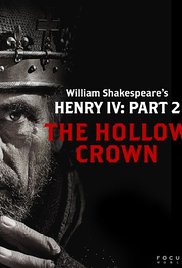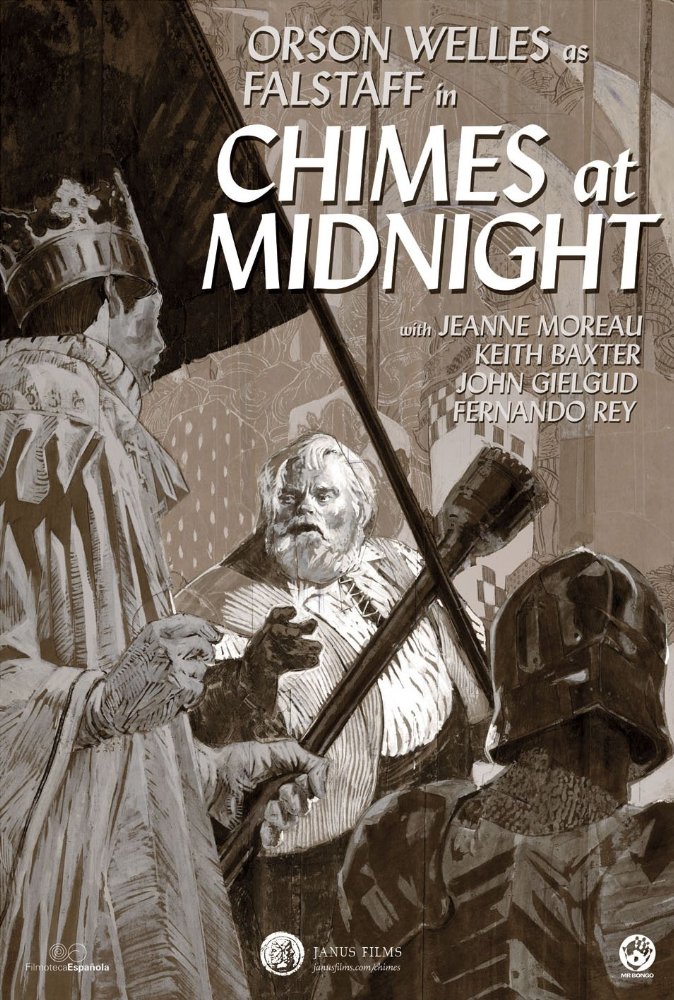When we were discussing possibilities for our next book at the Book Group’s last meeting, one Grouper said he was reading Harold Bloom’s Shakespeare: The Invention of the Human, and was fascinated by Bloom’s argument that Falstaff, the roistering old man in the Henry IV plays, was one of Shakespeare’s most important creations – ‘a great dream of reality’. He proposed that we read those plays. Perhaps our collective defences were down, but his proposal won the day.
Before the meeting:
Plays are meant for the stage rather than the page. That’s my excuse for not reading them, but watching two modified versions: the relevant episodes of the BBC’s The Hollow Crown (2012, adapted and directed by Richard Eyre), and Orson Welles’s 1965 Falstaff (Chimes at Midnight). The plot, in case you need it, is that Henry IV, who became king through pretty disgusting machinations in Richard II, now fights off rebels and establishes himself as a legitimate ruler. To his chagrin, his son and heir to the crown, Henry, Hal to his friends, lives a dissolute life under the mentorship of a gross, permanently drunk old man, Sir John Falstaff. It’s no spoiler to say that Hal comes good in the end, defeats the rebel Percy Hotspur, who in the king’s eyes has all the qualities Hal lacks, is finally reconciled with his father and assumes the crown, rejecting his former life and those who were his companions, most notably and dramatically Falstaff.
The Hollow Crown episodes have high production values, with a powerful Falstaff in Simon Russell Beale and a completely charming Tom Hiddleston as Hal. As two of seven episodes in a historical TV series that happens to be largely written by Shakespeare, they necessarily focus on the story of the king (played by Jeremy Irons). There’s a grimy realism to the portrayal of Falstaff and his world, so he comes across as a pathetic drunkard lacking in moral integrity who tries to cover the squalor of his life with witty patter and unconvincing bravado. When Hal insults him (trigger warning: there are a lot of fat jokes), it feels hurtful even at its most playful. Whatever its other strengths, this production is no help in understanding what Harold Bloom was talking about.
Chimes at Midnight is a huge contrast. It looks as if it was scraped together on the smell of an oily rag – possibly the oily rag that was left after John Gielgud, Jeanne Moreau, Ralph Richardson and Margaret Rutherford had been paid (though who knows, maybe they worked for very little). The sound is at times painfully iffy (lots of post-production dubbing), and the acting and mise-en-scène stagey to the nth degree. But the sheer exuberance of Welles’s Falstaff carries all before it.
I loved it when I saw it in the early 1970s, and I loved it again this week.
At one point, in the tavern/brothel where Hal, Falstaff and their fellow-roisterers hang out, Falstaff proposes a play, in which he will be the king. With a cushion on his head for a crown, and his vast bulk hoisted onto a raised chair, he upbraids Hal for his prodigal ways (anticipating a scene not much later when the real king does the same), and sings the praises of the good Sir John Falstaff. The original audience would have recognised, I remember from my university days, the presence of the traditional Lord of Misrule, a peasant crowned ‘king’ in a midwinter festival so that all normal, staid life gave way to riotous living. Falstaff in his tavern, full of life, big of body, delighting in language (including witty insults hurled at his own head), updates that tradition: a bright, irresponsible double of the calculating king in his forbidding court where every word is consequential and there is very little joy.
Which made me think of Donald Trump. In Part One Act 2 Scene 4, Falstaff is accused of lying. First he denies it:
What, art thou mad? art thou mad? is not the truth the truth?
Challenged to explain the discrepancies in his story, he shifts the ground. Why should he allow himself to be compelled to explain himself?
What, upon compulsion? ‘Zounds, an I were at the strappado, or all the racks in the world, I would not tell you on compulsion. Give you a reason on compulsion! If reasons were as plentiful as blackberries, I would give no man a reason upon compulsion, I.
Then he attacks his accuser:
‘Sblood, you starveling, you elf-skin, you dried neat’s tongue, you bull’s pizzle, you stock-fish! O for breath to utter what is like thee! you tailor’s-yard, you sheath, you bowcase; you vile standing-tuck —
And at last, confronted with hard evidence, he says he was joking.
In the final scene of the first play, Falstaff claims to have killed Hotspur. When Hal calls him on it, and asserts that he did it himself, Falstaff shakes his head:
Lord, Lord, how this world is given to lying!
We laugh. He is such an ingenious rogue. When Falstaff says, ‘Banish plump Jack, and banish all the world,’ we feel the truth of it, and when at the end of the second play, the newly crowned King Henry V turns to him and says, ‘I know thee not, old man,’ we don’t see the dashed hopes of an unrealistic opportunist (which is pretty much how it comes across in The Hollow Crown) so much as a terrible self-amputation that’s necessary if Hal is to assume political power responsibly. And it is necessary. If Falstaff were to have a position of influence at court, the political system would be in serious trouble.
If only someone could have invented a position of Misrule President, it might have been fun, for a week or so over summer, for a Falstaffian figure who ‘isn’t a politician’ to bully and bluster and joke at the expense of the carefully correct, to make outrageous claims for himself and outrageous threats against other people, to talk of alternative facts and fake news. So long as he did all that with panache we could enjoy the sheer gall of it. We might even laugh at his naughtiness as he robs people blind. For a week or so.
Banish plump Donald and banish all the world. Yes, I get that: we need irreverence. But elect plump Donald and wreck all the world.
The meeting:
Unusually, I came to this meeting with explicit expectations. I wanted to hear more about how Harold Bloom sees Falstaff, and I wanted to hear from a Group member who has played the role in the theatre.
It turned out that the latter played Falstaff decades ago in The Merry Wives of Windsor, which he said is a romp churned out by Shakespeare on short order at Queen Elizabeth’s request. The Falstaff in that play is a much less interesting creation, though much more sexually active, and attractive. Our actor had interesting things to say about the way Elizabethan audiences were much more sensitive to verbal subtleties than we are – they would go to hear a play, while we go to see one.
As for Bloom, evidently he goes through the usual perceptions of Falstaff one by one and demolishes them. Not a coward. Not a drunk. Not an opportunist. Not a liar, a thief, a scrounger or a knave. Instead, he is a great refuser of cant, a truth-speaker, a person who puts the joy of living and the joy of relationships above all else. I may be misrepresenting, as of course this discussion happened over barbecued sausages and salad and was far from interjection free. I was unconvinced. However, we were treated to a reading from Part One, Act V Scene 1. The battle (truly horrendous in the Welles movie) is about to start. Falstaff has asked Hal to protect him and been refused, Hal saying, ‘Thou owest God a death.’ Alone on stage, Falstaff ruminates:
calls not on me? Well, ’tis no matter; honour pricks
me on. Yea, but how if honour prick me off when I
come on? how then? Can honour set to a leg? no: or
an arm? no: or take away the grief of a wound? no.
Honour hath no skill in surgery, then? no. What is
honour? a word. What is in that word honour? what
is that honour? air. A trim reckoning! Who hath it?
he that died o’ Wednesday. Doth he feel it? no.
Doth he hear it? no. ‘Tis insensible, then. Yea,
to the dead. But will it not live with the living?
no. Why? detraction will not suffer it. Therefore
I’ll none of it. Honour is a mere scutcheon: and so
ends my catechism.
It’s wrong, according to Bloom (at third hand), to read this as a roguish rationalisation for cowardice. It is actually a deep challenge to the whole code of conduct built around the concept of honour, a code that accounts for an awful lot of violence and death. I was reminded of Israeli writer Etgar Keret on ABC Radio’s Books and Arts recently saying that when he asked his father what he was proudest of in his life, he said, ‘I have been in the front lines of five wars, and as far as I know I’ve never hurt anyone.’ That’s not dishonourable, but – arguably true also of Falstaff – it stands aside from the demands of honour.
My Trump-as-Falstaff thesis cut only a little bit of ice.





I found the Hollow Crown portrayal of the Hal / Falstaff dynamic really interesting. I wrote more about how the Hollow Crown and the Globe Theatre represent their relationship in different ways on my blog, if you’d like to read it: https://readandreview2016.wordpress.com/2017/01/18/what-i-watched-wednesday-the-hollow-crown-v-shakespeares-globe/ Thanks! 🙂
LikeLike
Thanks, Judith. It’s enlightening to read the responses of someone who is so steeped in the plays. Now you’ve made me want to go find the Globe production.
LikeLiked by 1 person
Thanks for your comment! You can purchase the DVDs, or they’re available at http://www.dramaonlinelibrary.com/. I can access them for free via my university, but I think for non-students, you’d have to pay. 🙂
LikeLike
sadly, only institutions can subscribe to the drama Onlne Library, Judith. But it’s good to know it exists, and there are always other sources.
LikeLike